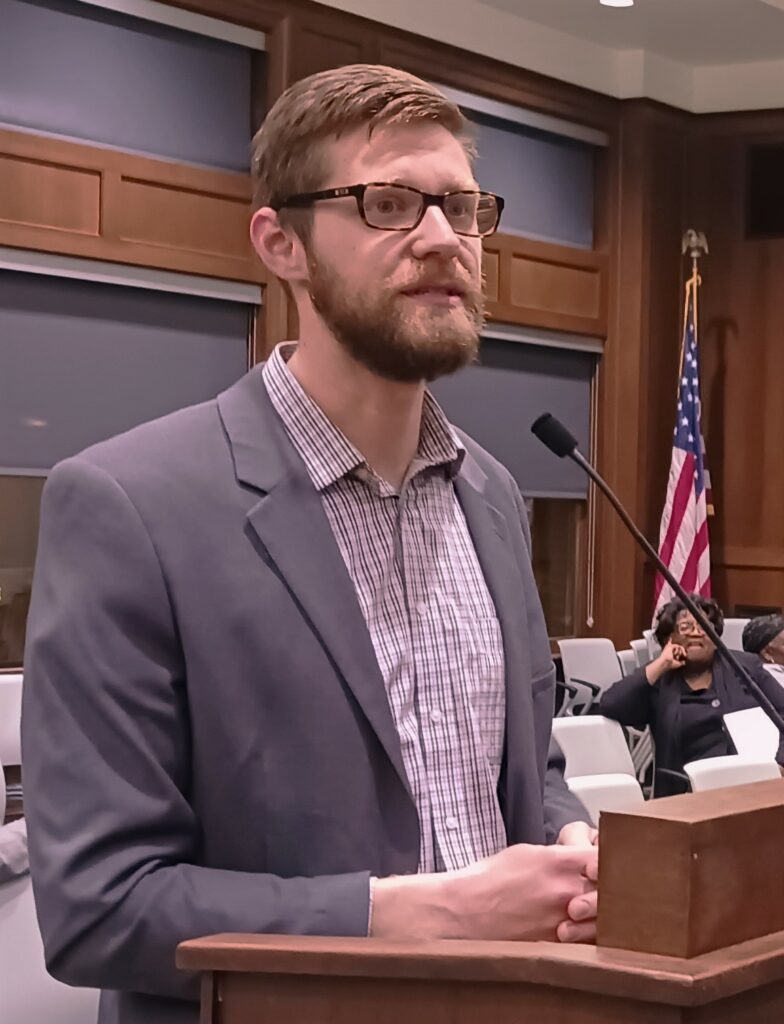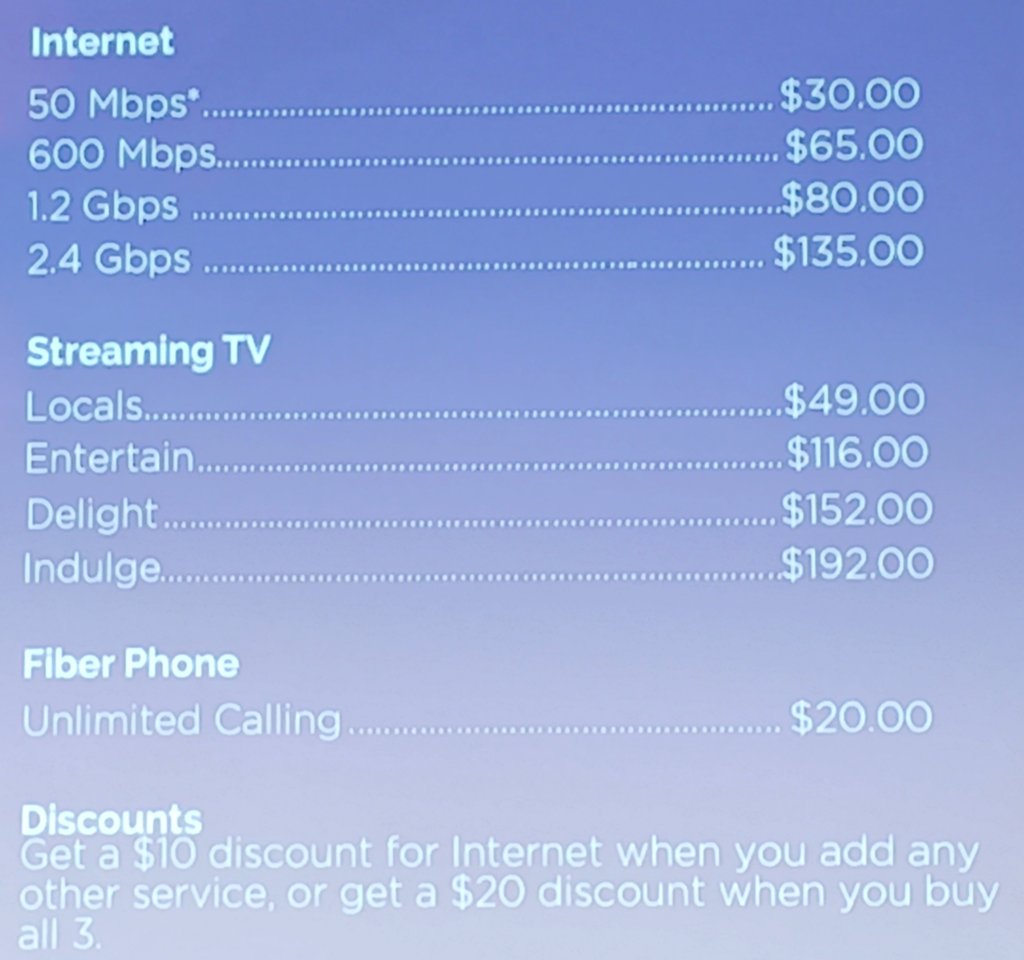Lancaster city has picked Edinburg, Virginia-based telecom company Shentel to help it restore and relaunch its long-stalled municipal broadband initiative, Mayor Danene Sorace told City Council on Monday.
Shentel, short for Shenandoah Telecommunications Co., will be tasked with completing the city’s partly built-out network of fiber optic cable and making affordable high-speed Internet service available to 100% of Lancaster’s households, Sorace said.
Shentel is “a partner that has been thoroughly vetted,” the mayor said.
Company representatives said they’re looking forward to finalizing a contract with the city and getting started with planning and design.

Factoring in the need to secure permits and coordinate with PPL, which owns the utility poles that the network will use, the actual buildout will likely start in the second half of 2024 and continue into 2026, Bryan Byrd, Shentel’s government and community affairs specialist said.
The resulting network will offer Shentel’s consumer “Glo Fiber” product, which offers Internet, streaming TV and home phone service. Current Glo Fiber broadband prices range from $65 per month for 600 Mbps service to $135 per month for 2.4 Gbps.
A special 50 Mbps service at $30 per month will be available to customers who are eligible for the federal Affordable Connectivity Program. The ACP provides for a $30-per-month discount, thus effectively offsetting Shentel’s price and making the service free.
For a household to be eligible, at least one person must qualify for a federal benefit program such as Medicaid, SNAP or free school lunch.

MAW and LancCity Connect
The city had the right concept when it launched its municipal broadband initiative nearly a decade ago during Mayor Rick Gray’s administration, Sorace said.
However, she continued, it arguably acted prematurely. Few other cities were attempting anything of the kind and there was no federal or state money earmarked for such assistance. Moreover, its vendor, MAW Communications, proved to be the wrong partner, she said.
MAW launched its residential service, LanCity Connect, in 2017, but ran into difficulties almost immediately. That winter, it was sued by PPL, which said MAW was making unauthorized connections to PPL’s poles. Subsequently, the city and MAW went to court over whether the city was obliged to pay for MAW’s legal costs.
In 2021, the city agreed to pay MAW $1.2 million and forgive the balance of a $1.5 million loan. In exchange, MAW relinquished ownership of the 16-mile fiber network it had built to date.
Building it had cost $2.7 million, billed to the city, bringing the total cost to $5.4 million, Sorace said.
Sorace acknowledged Monday that the city would do things differently if it were starting from scratch. But what’s done is done, she said, and whatever else is the case, the existing 16 miles of fiber constitute a viable, usable city asset — used, among other things, to support portions of the city’s traffic light control network and remote water meter reading system, as well as some of the Lancaster Safety Coalition’s surveillance cameras.
The goals for the relaunch remain the same as they were the first time around, Sorace said: Provide a backbone for the city’s IT services, such as remote water meter reading; offer all city residents access to affordable high-speed internet; and support economic development.
She expressed confidence that this time the city has the right partner.
To assess its needs and identify a vendor, the city worked with a consulting firm, CTC Technology & Energy. Broadly speaking, the city realized it had two options, Sorace said: It could take an active role in running the network, which offered the opportunity to earn revenue but came with considerable operational overhead and risk; or it could bring in a turnkey third-party vendor like Shentel.
It was clear the second option was the right one, she said: The alternative would require engineering and technical knowledge that the city simply doesn’t have.
Shentel beat out four other contenders: Comcast, FirstLight, Keystone Metro Fiber and Windstream.
About Shentel
Shentel has been in business for 121 years and is listed on the NASDAQ exchange under the symbol SHEN. It operates a multi-state fiber network in the mid-Atlantic that totals more than 8,300 miles and that it is in the process of extending into several other Lancaster County municipalities.
It will expand Lancaster’s network at its own expense. The city will not provide grants or loans, although it may act as a conduit for federal or state broadband infrastructure funding.
Shentel’s footprint in Lancaster County
- East Hempfield Township
- East Lampeter Township
- East Petersburg
- Lancaster Township
- Manheim Township
- Manor Township
- Millersville
- Mountville
- West Lampeter Township
Fiber is a “future-proof” technology, Byrd said. It offers extremely high data transfer speeds, and upload and download speeds are symmetrical, making ideal for business applications and users who work from home, who can teleconference and upload large files without worrying about limited upload speeds, he said.
The city and Shentel are in the process of negotiating a final contract, which will come to City Council for approval. Under it, Shentel will lease, maintain and operate the city’s existing network, and add additional mileage to complete it, which it will own.
Commercial and industrial sections of the city will be dealt with on a case-by-case basis, Kyle said: Shentel will look to secure customer commitments before building out.
He and Byrd declined to say how much market penetration Shentel is looking to achieve.
The city estimates that a little more than 100 customers remain on the LanCity Connect. For logistical reasons, it hasn’t made sense for the city to try and bill them, Sorace said, so they’ve had access for free — albeit with no customer support and no recourse should service be interrupted.
At some point, that will end. When the Glo Fiber service becomes available, they will be able to sign up or secure service elsewhere.
Shentel estimates it will end up deploying another 80 to 90 miles of cable, Christopher Kyle, vice president of industry affairs, said. Each section will be brought online as it is completed, he and Byrd said.
Full 100% residential coverage “is rare,” Kyle said, but that’s the city’s stipulation and Shentel is on board with it, he said.
“It’s been a long journey to get here,” Sorace said.






